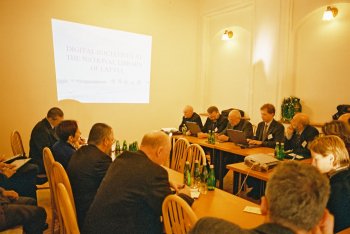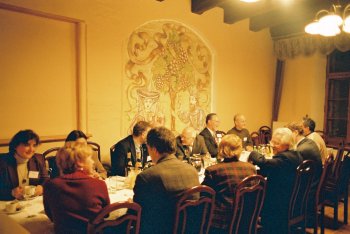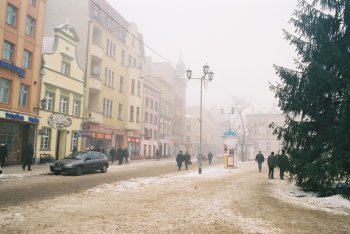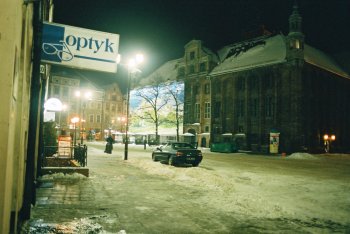DELOS CEE Event: Current Trends in Digitisation in Central and Eastern Europe
Getting there was not easy on a budget ticket - my flight was cancelled, and I was rescheduled to fly to Warsaw on a flight seven hours later. So I spent an unanticipated night in Warsaw before travelling on to Torun by train , some 150 miles further north (outside temperature around -12 deg. C, but amazingly warm inside). Torun is a small city of about 200,000 people with a surviving mediaeval core. It used to be on the border of Poland, and now it is in the centre, due to the redrawing of boundaries after WWII. The DELOS meeting took place mainly in an imposing tower in part of the city wall, just next to the remains of a castle formerly occupied by the Teutonic Knights - portrayed in Eisenstein’s ‘Alexander Nevsky’ wearing heavy Ned-Kelly style bucket helmets.
The theme of the conference was ‘Current Trends in Digitisation’. Chief Librarians (or often their deputies and spies, as one deputy observed) from all over the CEE region attended the meeting, including Belarus, Bulgaria, Croatia, Poland (of course), Macedonia, Hungary and Latvia.. One speaker came from Italy, to represent the MINERVA project. There were also several heads of projects, who spoke in detail about these on the second day. All in all about 40-plus attendees.
 |  |
Some countries represented don’t actually have digitisation programmes or projects under way (their presentations indicated this), but they had turned up to the meeting because they recognise that things are happening which they need to know about, and they wish to become involved.
The first day’s presentations addressed mainly theoretical and organisational issues. The Open Archives Forum presentation looked at the Open Archives Initiative Protocol for Metadata Harvesting (OAI PMH) as a tool for improving access to all kinds of digital objects. Later on there were some informal discussions about how this technology might be applied to existing and proposed digitisation projects. The second day revealed that there is quite a lot going on in the digitisation arena from Poland eastward and southward, and a good deal of it is interesting and useful. Most of it is aimed at making digital versions of Slavonic texts available (as might be expected), but there are others. One of the most interesting and useful projects has digitised the extremely accurate and detailed maps made by the Soviets which were ‘lost’ by them shortly before they left. There is also a good deal of material in Latin held in collections in eastern Europe which is of interest to scholars in the West, as well as in the East, and this is being digitised too.
During the meeting there was an outing to the Nikolaus Copernicus Library in Torun, where we were shown a number of rare books, including a first edition of the ‘De Revolutionibus’. This has been digitised, and is now available on a CD-Rom.
After the main part of the meeting there was a general discussion about issues of interest in digitisation. The most striking thing about what was said here was that the main problems the CEE countries are having with their programmes (not all of which are necessarily funded by the EU) are very similar (nearly identical in fact) to those we have in the West - that it is often difficult to communicate to funding organisations what the real problems and issues are. Funders generally see tasks in terms of technological issues - hardware, software, networking, websites,etc. When in fact organisational issues (often issues of design and service structure) are now much more important in terms of the creation and maintainance of services.
 |  |
As a networking opportunity this meeting was first class. There were several dinners and lunches, which gave ample scope for one-to-one discussions. There were only three native English speakers at the event (unless I miscounted), but much of the networking was conducted in English too. The event was also featured on Torun television (which we discovered later - at the time we thought it was just a person from the host institution ICIMSS wandering about with a video camera. Well worth the effort of getting there.
